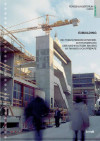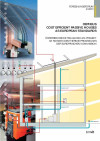Suchergebnisse für "Factsheet: Energietechnologien gestalten, die für alle sinnvoll und nutzbar sind"
heimWERT - Ökologisch-ökonomische Bewertung von Siedlungsformen

Ökologie und Ökonomie des Wohnens. Ein Bewertungssystem zur Einschätzung der Zukunftstauglichkeit von Wohngebäuden und Siedlungsstrukturen.
Was ist so schön am Eigenheim - Ein Lebensstilkonzept des Wohnens

Motive hinter dem Wunsch auf eine bestimmte Art zu Wohnen - hier vor allem das Wohnen im Einfamilienhaus - erklärt über ein Lebensstilkonzept Mag. Winfried Moser, Dr. Dieter Reicher, Mag. Rainer Rosegger, Mag. Monika de Frantz, Mag. Margarethe Havel
Architekturhistorisch differenzierte, energetische Sanierung

Bauten der Nachkriegsmoderne unter Denkmalschutz. Vergleichende Analyse energetischer Sanierung Fallbeispiel Freiluftschule Franklinstraße, Wien 21
Kriterienkatalog zur Qualitätssicherung in der Ausführung von Passivhäusern in Holzbauweise
Mögliche Fehlerquellen bei der Ausführung von Passivhäusern in Holzbauweise sollen gewerkspezifisch und beim Einbau haustechnischer Anlagen durch einen Kriterienkatalog aufgezeigt, Lösungen erarbeitet und ein baustellentaugliches Kontrollinstrument zur Verfügung gestellt werden.
Maßnahmen zur Minimierung von Rebound-Effekten bei der Sanierung von Wohngebäuden (MARESI)

MARESI entwickelt Strategien zur Minimierung von Reboundeffekten bei der energetischen Wohngebäudesanierung auf Basis von Mikrodatenanalysen und Fallstudien.
Urban Future - "Resource Efficient City of Tomorrow"
Challenges fort he cities of tomorrow with research issues referring to resource management, efficiency and technology development
Fassadenintegration von thermischen Sonnenkollektoren ohne Hinterlüftung

Klärung der Anforderungen von Architekten, Dimensionierungsrichtlinien von Fassadenkollektoranlagen, Speichermanagement. Errichtung von Testanlagen.
Mehrsprachig
REVITALISIERUNG mit S.A.M. - Synergie aktivierende Module

Fallspezifisch entwickelte Synergie aktivierende Module zur Revitalisierung bestehender Baustrukturen ohne Nutzungsunterbrechung (zwei Projekte, eine Ausführung).
Passivhaus-Kindergarten mit Heilpädagogischer Integrationskindergruppe
Öffentliches Gebäude in Passivhaus-Technik unter Verwendung von lokal verfügbaren Baustoffen mit der Vorgabe eines streng limitierten Kostenrahmens.
PEB - Plus-Energy-Office
An integrated technical energy plus office concept without additional building costs demonstrates the feasibility of such projects instancing a concrete office project with 50.000 m² floor area in Vienna with economical cost consideration.
New Conceptions for elderly people in new construction and renewal

Development of a catalogue of criteria for senior-housing and detailed implementation plans of a new building and/or of a reorganization project in Vienna, located in the 16th district; Costs and comparison analysis between "ordinary" New building and/or "ordinary" Reorganization and senior-housing new buildings and/or renewal
SIBAT - Ensuring indoor air quality of buildings - inclusion of toxicological criteria in the assessment of building materials

Development of a pragmatic assessment scheme applicable to building practice for the impact of building products on human health
Formulation of directives for the environmentally conscious choice of upgraded insulation and surface coatings for walls and floors, the basis for the awarding of the international eco-label natureplus

E3 Building

Ein thematisches Netzwerk zur Forcierung des nachhaltigen Bauens im Rahmen von PREPARE
Forschungsforum
1/2001
Herausgeber: BMVIT
Deutsch, 6 Seiten
Downloads zur Publikation
COOLSAN - refrigeration concepts for office and administrative buildings retrofit

Technologies to enhance comfort and minimise energy requirements for air conditioning in existing office and administrative buildings. Possibilities to reduce the cooling loads and strategies for the use of passive cooling systems.
Cepheus Cost Efficient Passive Houses As European Standards

Österreichische Teilnahme am Projekt im Rahmen des THERMIE-Programms der Europäischen Kommission
Forschungsforum
2/2001
Herausgeber: BMVIT
Deutsch, 6 Seiten
Downloads zur Publikation
Inter-linked design as a strategy towards sustainable buildings - removing deficiencies of learning and of diffusion

The aim is to investigate the role of inter-linked design team organisation in the design of sustainable buildings and to formulate ready-to-use recommendations and guidelines for dissemination.
PH Office - Criterions for energy-efficient office buildings
The passive house standard and energy-efficient building technologies are getting increasingly important for office buildings, too. However, standardisation is not completed on the same level as known from the residential building sector. The project at hand brings in definitions and makes a suggestion on a standardised calculation method for office buildings in passive house quality.
Benchmarking - sustainability of housing subsidies across the federal provinces

Systematical description, analysis and comparison of all ecological, economic and social sus-tainability of the systems aspects of housing subsidy for new buildings and the renovation of buildings across the federal provinces of Austria; an analysis of regional-economic effects and a statistical-econometric analysis of the allocation effects of housing subsidies.
Development of a Cost-Benefit-Tool: costs and benefits of energy efficient and ecologic buildings
Development of a cost-benefit-tool which reaches beyond a pure cost approach and also recognizes the benefits of a building for its inhabitants and users. The inclusion of benefits is based on existing evaluation systems, especially on the Austrian building evaluation system TQB - Total Quality Building, which has been revised in 2009.
